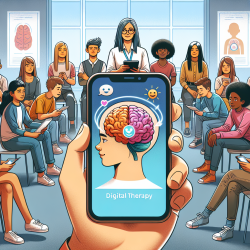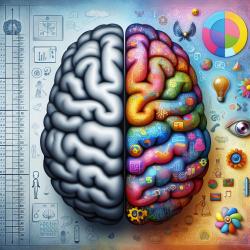Unlocking the Power of Digital Interventions in Adolescent Mental Health
In an era where digital technology is reshaping various sectors, mental health care is no exception. A recent pilot cohort study conducted in Indian schools has demonstrated the transformative potential of an app-based guided problem-solving intervention for adolescent mental health. The study, titled App-based guided problem-solving intervention for adolescent mental health: a pilot cohort study in Indian schools, explores the feasibility and effectiveness of the 'POD Adventures' app in addressing mental health challenges among adolescents.
Why Digital Intervention?
With nearly half of the global adolescent population residing in low and middle-income countries (LMICs), there is a significant gap in mental health services. In India alone, less than 10% of young individuals have access to formal mental health care. Digital interventions offer a promising solution by increasing accessibility, reducing stigma, and lowering costs compared to traditional methods. The 'POD Adventures' app integrates face-to-face interaction with self-guided digital content, providing a comprehensive approach to mental health support.
Key Findings from the Study
The study involved 248 participants from grades 9-12 in two coeducational government-aided secondary schools in Goa, India. The intervention was delivered in two formats: mixed (individual and small group sessions) and group (small group sessions only). The outcomes were remarkable:
- High Completion Rate: 92.7% of participants completed the intervention, showcasing its feasibility and acceptability.
- Significant Improvements: At 4 weeks, there were significant improvements in problem severity, mental health symptoms, stress, and well-being, which were maintained at 12 weeks.
- User Satisfaction: Participants found the app easy to use, engaging, and helpful in problem-solving, with high satisfaction scores across both delivery formats.
Implications for Practitioners
The findings suggest that 'POD Adventures' could serve as an early intervention tool for adolescents in low-resource settings. Practitioners can leverage this app to provide scalable mental health support, especially in areas with limited access to traditional services. The integration of digital tools with human facilitation optimizes engagement and outcomes, making it a viable option for school-based mental health programs.
Encouraging Further Research
While the pilot study shows promising results, further research is needed to refine the intervention and evaluate its long-term impact. Practitioners are encouraged to explore the potential of digital interventions in their settings and contribute to the growing body of evidence supporting their efficacy.
To read the original research paper, please follow this link: App-based guided problem-solving intervention for adolescent mental health: a pilot cohort study in Indian schools.










